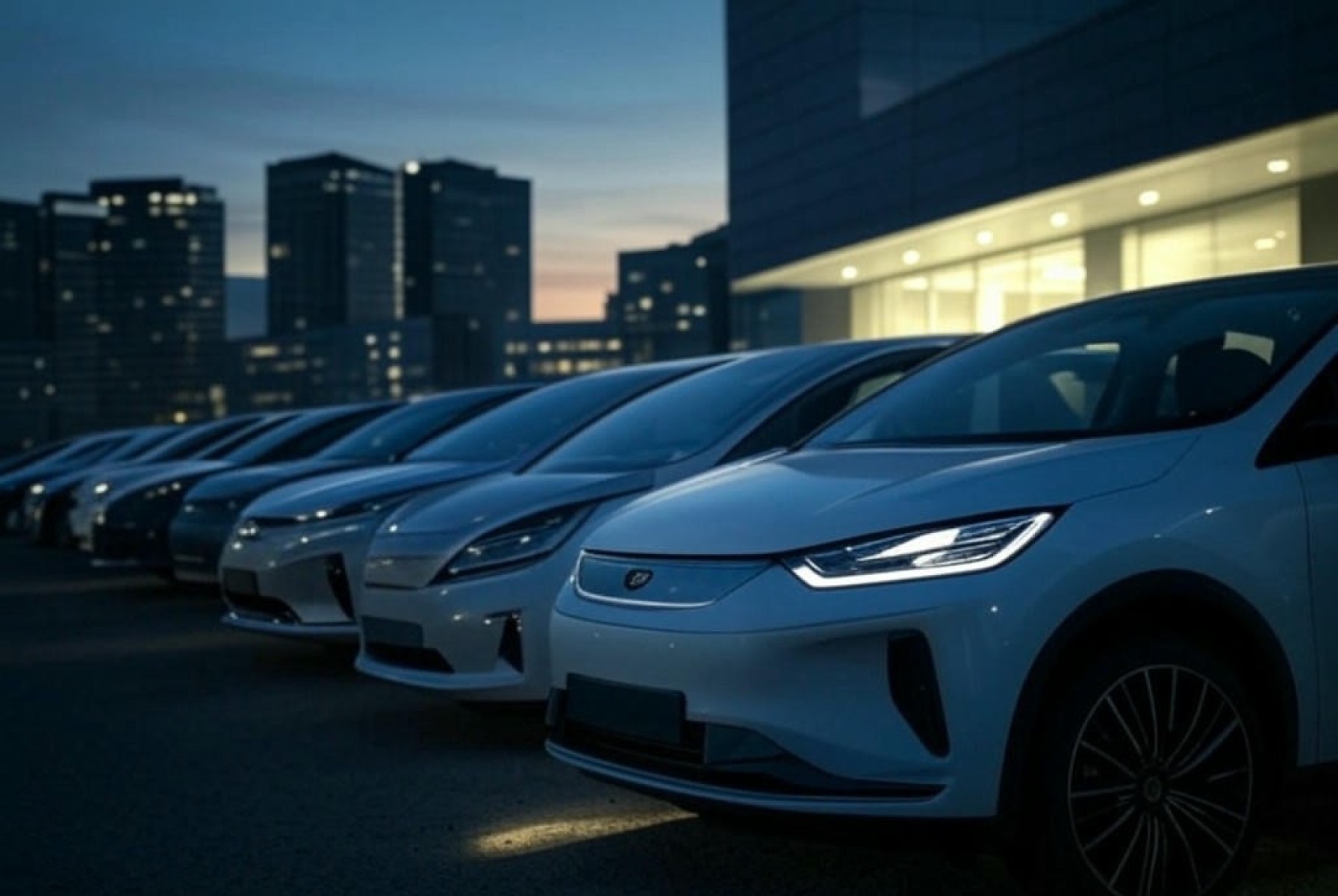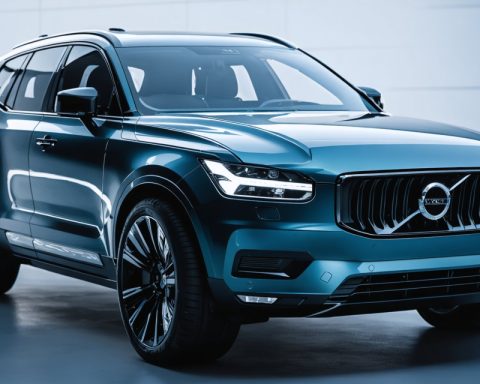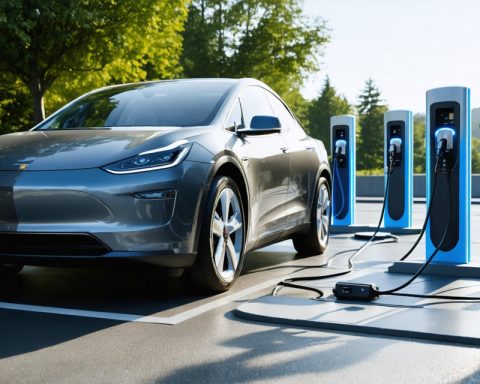- Global electric vehicle (EV) sales surged by 56.9% in February year-over-year, indicating rapid growth and widespread adoption in 15 major markets, including China, the U.S., and Germany.
- While February saw a slight 3.4% dip month-over-month due to seasonal factors in China, overall market vigor remains strong with 1.038 million units sold.
- Electric vehicles captured 22.7% of the global vehicle market share, up 6.6 points from the previous year.
- China’s BYD led the industry with a 150.5% year-over-year sales increase, contrasting with Tesla’s 12.4% decline as it faces heightened competition, especially in Europe.
- The electric vehicle landscape is driven by policy support and growing consumer demand for sustainable transport, signaling a fundamental shift in the automotive sector.
- The narrative underscores that EVs are not just a trend but the future of transportation, demanding industries and nations to adapt to the advancing technological era.
As February’s chill receded in the world’s major markets, the electric vehicle (EV) sector was electrified with a shocking revelation: a 56.9% leap in global sales compared to the same period last year, marking a prolific surge for the eco-friendly automotive era. Capturing the heart of 15 key nations, including the tech-savvy landscapes of China, the United States, and Germany, the data drew a vibrant picture of where the future of transportation is headed.
Despite a slight dip from January, with sales falling 3.4% month-over-month, the electric vehicle market has shown unprecedented vigor. The seasonal slowdown, largely attributed to China’s spring festivities, masked the underlying robust growth compared to a dismal start last year when price wars temporarily dampened enthusiasm. Yet, February’s sales soared to an impressive 1.038 million units across the targeted markets, claiming 22.7% of the total vehicle market share, a 6.6 point increase from the previous year.
The year-to-date statistics firmly bolster claims of an EV revolution brimming on the horizon. In the first two months of the year alone, sales climbed a staggering 36.9%, with electric cars entrenched as a dominant force on the roads.
Leading the charge was China’s BYD, posting a dramatic year-over-year leap of 150.5% and cementing its position as the industry titan with 263,000 units sold, a month-over-month increase of 7.7%. Meanwhile, Tesla, the long-reigning icon of electric innovation, found itself grappling with a 12.4% decrease from last February. The decline signals tumultuous waters, especially in the European market where competition has intensified.
In stark contrast, Geely, another formidable Chinese contender, noted a 134.2% climb from the previous year despite a current dip driven by seasonal factors. Meanwhile, stalwarts like General Motors and Volkswagen round out the top five, demonstrating both the might and the volatility of global pioneers in this electric landscape.
This vivacious growth story is not confined to China or even mega-corporations alone. The worldwide expansion paints a picture of burgeoning electrification across continents, spurred by both policy backing and consumer demand for greener, more sustainable transport options. The numbers tease an imminent transformation, hinting that soon, silence—not the roar of an engine—will greet us on city streets.
A pivotal message stands out amid this data deluge: the electric vehicle is no longer a mere trend or an option; it’s the new dawn of the automotive epoch. As innovation accelerates, industries and nations must align, adapt, and advance to keep pace with the ever-changing tides of technological evolution.
Why Electric Vehicles Are Accelerating Faster Than Ever
Overview of the Electric Vehicle Market Surge
The global electric vehicle (EV) market is experiencing unprecedented growth, with February witnessing a soaring 56.9% increase in sales compared to the previous year. While sales dropped slightly from January (a 3.4% decrease attributed to seasonal factors), the market is demonstrating significant long-term traction. Total sales hit 1.038 million units, capturing a market share of 22.7%, marking a 6.6 point increase from the prior year. The rapid expansion underscores the electric vehicle’s transformation from a niche trend to a major player in the automotive industry.
Key Industry Players
– BYD Auto: Leading the market with a stunning 150.5% year-over-year growth, achieving 263,000 unit sales. BYD’s aggressive market strategy and expanding model lineup have bolstered its position as a market leader, particularly in China.
– Tesla: Despite being a longstanding icon of EV innovation, Tesla faced a 12.4% year-over-year drop in February sales. This decrease highlights challenges in the European market where competition is intensifying.
– Geely: Emerging strongly with a 134.2% increase compared to last year, though current figures reveal a slowdown due to seasonal trends, reaffirming Geely as a notable industry competitor.
– General Motors and Volkswagen: Rounding out the top five in global sales, both continue to vie for EV dominance, reflecting the mix of stability and market volatility in their trajectories.
Factors Driving Growth
1. Policy and Incentives: Countries are enforcing stringent emissions regulations and offering substantial subsidies to encourage EV adoption. For instance, China’s vigorous policy support, Europe’s CO2 regulations, and the United States’ federal incentives act as key growth catalysts.
2. Technological Advancements: Enhancements in battery technology, including increased range and reduced costs, are pivotal. These innovations are making EVs more accessible and appealing to a broader consumer base.
3. Consumer Demand for Sustainability: Increasing environmental awareness is pushing drivers towards cleaner, greener transportation, with consumers actively opting for vehicles that reduce carbon footprints.
Market Trends and Predictions
– Expansion of Charging Infrastructure: A significant rise in EV charging stations globally is anticipated to support the growing number of electric vehicles, making long-distance travel more feasible and convenient.
– Diverse Model Offerings: Automakers are diversifying their offerings, including sedans, SUVs, and trucks, to cater to various consumer preferences, resulting in expanded customer bases.
– Global Penetration: While China remains a robust market due to its governmental support and market size, Europe and North America continue to witness impressive growth spurred by local manufacturing and consumer education.
How to Prepare for the EV Shift
1. Adopt EV-Friendly Practices: Businesses should consider installing EV charging stations and transitioning company fleets to electric to stay ahead in the sustainability curve.
2. Stay Informed on Incentives: Both consumers and businesses should stay updated on federal and local incentives for EV purchases to maximize financial benefits.
3. Invest in EV Technology: Investors should explore opportunities in the EV sector, keeping an eye on emerging technologies and companies with robust growth potential.
Pros & Cons of Electric Vehicles
Pros:
– Environmental benefits with reduced emissions.
– Lower operational costs over time.
– Quieter and smoother driving experience.
Cons:
– Higher upfront costs compared to traditional vehicles.
– Limited range and charging infrastructure in rural areas.
– Variability in resale value as technology evolves rapidly.
Conclusion
The electric vehicle market is rapidly transforming the automotive landscape, driven by a confluence of technological innovation, policy support, and escalating consumer demand for sustainable transport solutions. Staying informed, flexible, and proactive is crucial for catching the wave of this electric revolution.
For more insights into the ever-evolving EV market, explore resources at TESLA and Volkswagen.














